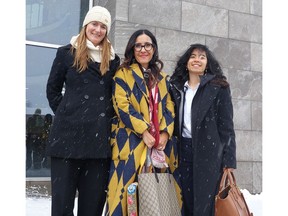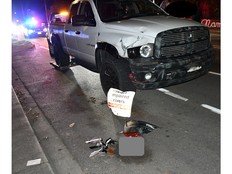Indigenous title claim 'hangs like a guillotine' over company: lawyer
Massive legal case involves dozens of lawyers and will likely take years, if not decades, to decide

Article content
A New Brunswick wood-cutting firm says an aboriginal claim to its property “hangs like a guillotine” over the business, seriously threatening it and the jobs it has created.
J. Crabbe & Sons Ltd. was one of three firms that appeared in Saint John’s Court of King’s Bench on Monday as part of motion to strike the Wolastoqey Nation’s request for a certificate of pending litigation on just over 5,000 parcels of privately owned forestry land in the western half of the province.
The certificate is hotly disputed in the massive litigation case.
If awarded, the certificate would provide official court notice to the public that a property was subject to a legal dispute. The practical effect of such a court-imposed sanction would prevent the owners from selling or mortgaging their properties until title was cleared up.
Alex Cameron, a lawyer representing H.J. Crabbe, said the Florenceville-Bristol company employs more than 150 people between its sawmills, pellet operations and woodlands. Almost all its land is claimed by the six Wolastoqey Nations that are part of the case it launched in 2021 asserting title for more than half of New Brunswick.
“The mere pleading of this claim hangs like a guillotine over my client and seriously threatens his business,” said Cameron, who helped defeat a different aboriginal claim for timber rights for the entire province of Nova Scotia when he was a government lawyer in 2005 in a case that went all the way to the Supreme Court of Canada.
Cameron said by naming eight big firms that operate in the vast forest lands, the Indigenous officials had targeted New Brunswick’s industrial engine and threatened “to inflict chaos on the province’s economy.”
It was clear from the outset Monday a lot was at stake.
Several legal teams jammed the hallway outside, most of the lawyers carrying massive dossiers with reams of evidence, before two courtrooms were opened for the proceedings. There were so many lawyers and aides, more than two dozen, that Justice Kathryn Gregory had to switch back and forth between the two courtrooms, depending on whose arguments were being made, with the other side getting a video feed of the proceedings.
This case has been brought randomly against some property owners and not others.
Hugh Cameron
The evidence filled two banker’s boxes and numbered thousands of pages.
Several times during the day, the judge had to take some time to find the right document on her computer screen.
“Page two thousand and what?” Gregory said at one point to a lawyer giving her a page reference.
Underlining the importance, a representative from New Brunswick’s attorney general’s office reminded her that forestry was worth $1.5 billion to the provincial economy, one of the largest employers with 24,000 workers and kept alive many mom and pop shops servicing several communities.
But it was the legal teams for the private firms who made the most pressing arguments.
The lawyer for Acadian Timber, Hugh Cameron (no relation to Alex Cameron) of Stewart McKelvey in Fredericton, said aboriginal title claims often take decades to go through the courts and called the Wolastoqey Nation’s latest legal manoeuvring “scandalous, vexatious, and an abuse of process.”
He pointed out that New Brunswick had some 200,000 property owners and it was odd that only eight industrial firms with private property, other than Crown or public land, were part of the litigation.
“This case has been brought randomly against some property owners and not others,” he said. “Why should Acadian have to suffer?”
And while he didn’t offer figures, he said the company’s insurance had already gone up because of the court claim and that it was in danger of losing its insurance provider.
Like H.J. Crabbe, Acadian depends on its land for collateral with lenders to sustain and grow the business. Without proper title to the land it owns, its business is at risk, he said.
Furthermore, he argued that the Indigenous communities were late asking for a certificate. Acadian bought most of its parcels from Fraser Paper in 2006 for $138 million. Three of the original company trustees – including businessman Bud Bird, who served in federal and provincial cabinets and was Fredericton’s mayor – provided evidence that they’d never been warned that title was under dispute for the land they were purchasing.
Most of the land was privately held by Fraser for 60 years before that, with the first parcel bought as far back as 1871.
“Had they known about it, they likely wouldn’t have bought the land,” Cameron said. “They’ve done no wrong and paid valuable consideration for their properties.”
J.D. Irving, Limited, is New Brunswick’s biggest wood-cutting company and owns 40 per cent of the land in the title claim.
Represented by Paul Steep from the law firm McCarthy Tetrault in Toronto, he made the argument that the Land Titles Act and the New Brunswick Registry Act, which governs all property ownership, were not compatible with what the Wolastoqey wanted.
It’s abusive and should be struck.
Paul Steep
He went through years of case law, mostly from British Columbia and Ontario, in which the courts had said “the registry is everything.”
He said the Wolastoqey had asked for the certificate for tactical reasons, as leverage in their legal fight.
“It’s entirely collateral to the litigation. It’s abusive and should be struck.”
He said aboriginal title claims conflicted with the private land title system because among Indigenous societies, land was held communally and for generations, land that couldn’t be sold.
“These characteristics don’t mesh up against the land title system,” he said. “The primary principle is to guarantee ownership under government authority. Aboriginal title was never that – it existed long before the registries were created.”
Following hours of arguments, the lawyers for the Wolastoqey team didn’t have much time to respond.
Renée Pelletier of OKT law in Halifax said there was nothing “frivolous, vexatious or scandalous,” about its demand for the certificate, arguing such a step was the only legal way to provide binding notice that the title of the land was in dispute.
She also said it was important to note that the Wolastoqey had never surrendered their right to hunt, fish and gather on their territory and that the “land is deeply rooted and sacred,” and “more than a commodity” to Indigenous people, an idea, the lawyer said, that had been recognized by the Supreme Court of Canada in other cases.
Furthermore, she argued the opposing lawyers had only referred to old case law. Aboriginal title law was still developing, she said.
“Novelty is not a basis for striking a claim,” Pelletier said, adding the Wolastoqey claim was clear it was only seeking title to Crown land, NB Power property and the land of the eight big firms, not other private owners.
Her team will continue presenting arguments on Tuesday.












Postmedia is committed to maintaining a lively but civil forum for discussion. Please keep comments relevant and respectful. Comments may take up to an hour to appear on the site. You will receive an email if there is a reply to your comment, an update to a thread you follow or if a user you follow comments. Visit our Community Guidelines for more information.